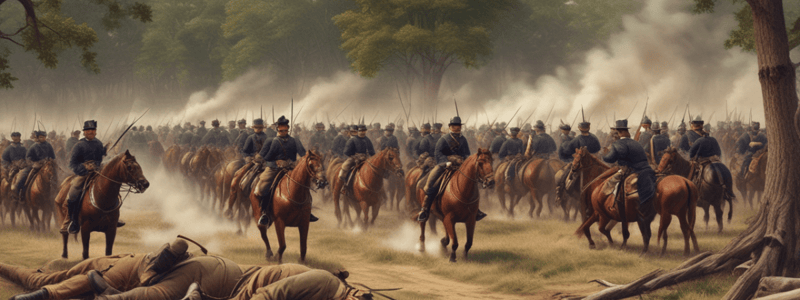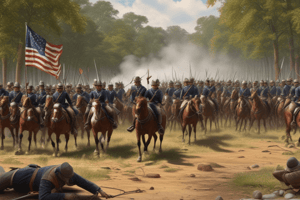Podcast
Questions and Answers
What led to panic, chaos, and a rout among the Union soldiers during the First Battle of Bull Run?
What led to panic, chaos, and a rout among the Union soldiers during the First Battle of Bull Run?
- General McDowell's ineffective leadership
- The Confederate counterattack on the Union's right flank
- The road to Washington being clogged by civilians' wagons (correct)
- The Union soldiers' tiredness and inexperience
How did the South react to the victory in the First Battle of Bull Run?
How did the South react to the victory in the First Battle of Bull Run?
- With a demand for peace negotiations
- With a boost of morale and confidence (correct)
- With a sense of indifference
- With despair and disappointment
What was the outcome of the First Battle of Bull Run for the Union Army?
What was the outcome of the First Battle of Bull Run for the Union Army?
- A rout (correct)
- A decisive victory
- A stalemate
- A narrow defeat
What was the approximate percentage of the Union force lost during the First Battle of Bull Run?
What was the approximate percentage of the Union force lost during the First Battle of Bull Run?
What was the total number of casualties during the First Battle of Bull Run?
What was the total number of casualties during the First Battle of Bull Run?
Who replaced General McDowell as the commander of the Army of Northeastern Virginia?
Who replaced General McDowell as the commander of the Army of Northeastern Virginia?
What was the new name given to the reorganized army under McClellan's command?
What was the new name given to the reorganized army under McClellan's command?
What was the size of the Army of the Potomac when it marched out of Washington in the spring of 1862?
What was the size of the Army of the Potomac when it marched out of Washington in the spring of 1862?
Who took command of the Army of Northern Virginia in May 1862?
Who took command of the Army of Northern Virginia in May 1862?
What was the outcome of the First Battle of Bull Run for the Confederacy?
What was the outcome of the First Battle of Bull Run for the Confederacy?
How many men did President Lincoln call up for three-year enlistments after the battle?
How many men did President Lincoln call up for three-year enlistments after the battle?
What was the primary reason for the Union's defeat at the First Battle of Bull Run?
What was the primary reason for the Union's defeat at the First Battle of Bull Run?
What was the main impact of the First Battle of Bull Run on the North's perception of the war?
What was the main impact of the First Battle of Bull Run on the North's perception of the war?
What was the result of the congestion on the road to Washington after the battle?
What was the result of the congestion on the road to Washington after the battle?
What was the approximate number of soldiers involved in the First Battle of Bull Run?
What was the approximate number of soldiers involved in the First Battle of Bull Run?
What was the effect of the First Battle of Bull Run on Jefferson Davis's perception of the war?
What was the effect of the First Battle of Bull Run on Jefferson Davis's perception of the war?
What was the main reason for the Confederate army's inability to pursue the Union soldiers after the battle?
What was the main reason for the Confederate army's inability to pursue the Union soldiers after the battle?
What was the impact of the First Battle of Bull Run on the Union's preparation for war?
What was the impact of the First Battle of Bull Run on the Union's preparation for war?
Who was given credit for the Confederate victory in the First Battle of Bull Run?
Who was given credit for the Confederate victory in the First Battle of Bull Run?
What was the significance of the casualties in the First Battle of Bull Run?
What was the significance of the casualties in the First Battle of Bull Run?
What was the impact of the First Battle of Bull Run on the Union's commander?
What was the impact of the First Battle of Bull Run on the Union's commander?
Study Notes
The First Battle of Bull Run
- The First Battle of Bull Run was the first major battle of the American Civil War, fought on July 21, 1861.
- Approximately 60,000 men got their first combat experience in the battle, which resulted in a Confederate victory.
Background
- Abraham Lincoln was inaugurated as President in March 1861, and southern states began seceding from the United States of America.
- The Confederates formed a new nation, the Confederate States of America, and Lincoln was faced with a crisis of immense proportions.
- Fort Sumter in Charleston, South Carolina, became an important test for Lincoln, as the Confederates demanded its surrender.
Ramping Up the War Effort
- Lincoln called for 75,000 volunteers to suppress the rebellion, which led to four more states seceding from the Union.
- The Union army, known as the Army of Northeastern Virginia, was formed, with Major Irvin McDowell as its commander.
- Meanwhile, the Confederacy was also organizing its military, with Jefferson Davis as its president.
The First Battle of the Civil War
- The First Battle of Bull Run was fought near Manassas Junction, Virginia, on July 21, 1861.
- The Confederate army, led by P.G.T. Beauregard and Joseph E. Johnston, was defending the area against the Union army led by McDowell.
- The battle was a delay-and-attack strategy, with the Union army attempting to cross Bull Run Creek and attack the Confederate flank.
The Battle
- The battle started with Union artillery fire on Confederate positions, followed by a Union march on Sudley Springs Ford to attack the Confederate left flank.
- The Confederates were initially forced back, but the arrival of Thomas "Stonewall" Jackson's Virginia brigade stabilized the line.
- The battle turned in favor of the Confederates, and the Union army retreated in disarray.
Aftermath
- The Confederates won the battle, but at a cost of 390 killed, 1,600 wounded, and 12 missing.
- The Union army suffered 480 killed, 1,000 wounded, and 1,200 missing.
- The battle was a wake-up call for both sides, realizing that the war would be longer and bloodier than expected.
Next Steps in the Conflict
- President Lincoln called for the recruitment of 500,000 more men for three-year enlistments.
- General McDowell was removed from command, and George B. McClellan took over the Army of the Potomac.
- Jefferson Davis also called up 500,000 volunteers for three-year enlistments, and the war continued to escalate.
The First Battle of Bull Run
- The First Battle of Bull Run was the first major battle of the American Civil War, fought on July 21, 1861.
- Approximately 60,000 men got their first combat experience in the battle, which resulted in a Confederate victory.
Background
- Abraham Lincoln was inaugurated as President in March 1861, and southern states began seceding from the United States of America.
- The Confederates formed a new nation, the Confederate States of America, and Lincoln was faced with a crisis of immense proportions.
- Fort Sumter in Charleston, South Carolina, became an important test for Lincoln, as the Confederates demanded its surrender.
Ramping Up the War Effort
- Lincoln called for 75,000 volunteers to suppress the rebellion, which led to four more states seceding from the Union.
- The Union army, known as the Army of Northeastern Virginia, was formed, with Major Irvin McDowell as its commander.
- Meanwhile, the Confederacy was also organizing its military, with Jefferson Davis as its president.
The First Battle of the Civil War
- The First Battle of Bull Run was fought near Manassas Junction, Virginia, on July 21, 1861.
- The Confederate army, led by P.G.T. Beauregard and Joseph E. Johnston, was defending the area against the Union army led by McDowell.
- The battle was a delay-and-attack strategy, with the Union army attempting to cross Bull Run Creek and attack the Confederate flank.
The Battle
- The battle started with Union artillery fire on Confederate positions, followed by a Union march on Sudley Springs Ford to attack the Confederate left flank.
- The Confederates were initially forced back, but the arrival of Thomas "Stonewall" Jackson's Virginia brigade stabilized the line.
- The battle turned in favor of the Confederates, and the Union army retreated in disarray.
Aftermath
- The Confederates won the battle, but at a cost of 390 killed, 1,600 wounded, and 12 missing.
- The Union army suffered 480 killed, 1,000 wounded, and 1,200 missing.
- The battle was a wake-up call for both sides, realizing that the war would be longer and bloodier than expected.
Next Steps in the Conflict
- President Lincoln called for the recruitment of 500,000 more men for three-year enlistments.
- General McDowell was removed from command, and George B. McClellan took over the Army of the Potomac.
- Jefferson Davis also called up 500,000 volunteers for three-year enlistments, and the war continued to escalate.
Studying That Suits You
Use AI to generate personalized quizzes and flashcards to suit your learning preferences.
Description
Test your knowledge about the First Battle of Bull Run, the first major battle of the American Civil War, fought on July 21, 1861. Learn about its significance and outcome.




